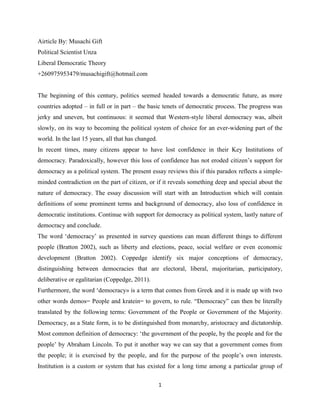This document discusses democratic theory and citizens' support for democracy despite losing confidence in democratic institutions. It begins by defining democracy and institutions, then discusses how citizens have become more critical of political elites as values have shifted to post-material issues. While citizens are less trusting of institutions like political parties, this critical view reflects greater political sophistication rather than discontent with democracy itself. The essay will examine whether citizens' paradoxical views reveal something fundamental about the nature of democracy.







